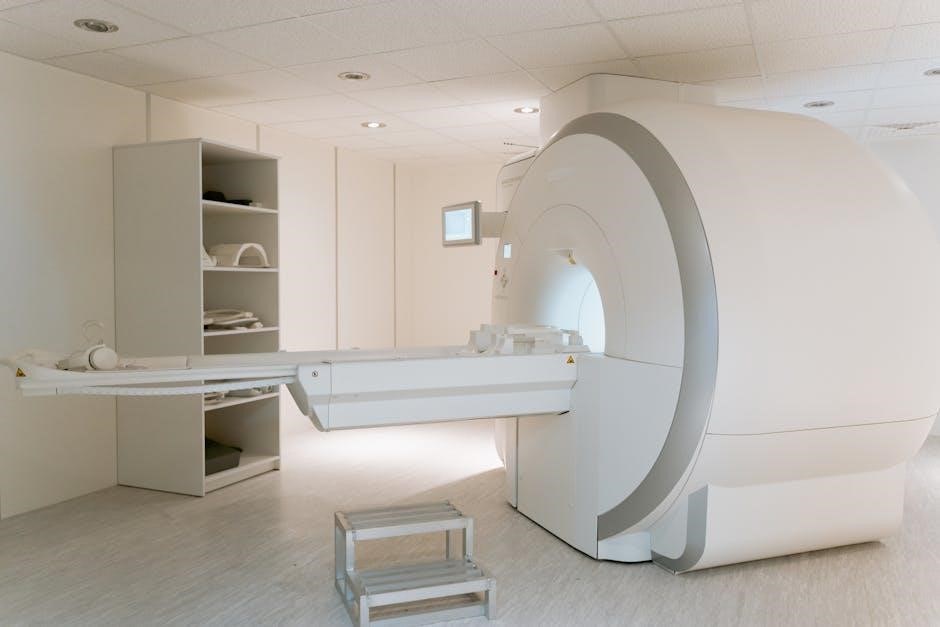The Child and Adolescent Functional Assessment Scale (CAFAS) is a widely recognized tool for evaluating the day-to-day functioning of children and adolescents․ It assesses how youths handle everyday tasks, such as attending school and interacting with others, providing insights into their strengths and challenges․ Developed in 1989, the CAFAS is used by mental health professionals to guide treatment planning and track progress over time․ Its comprehensive approach makes it a valuable resource for understanding a youth’s overall functioning and service needs․
Overview of the CAFAS Assessment
The CAFAS is a clinician-administered tool that evaluates a child’s or adolescent’s functioning across critical life areas․ It assesses how well a youth manages daily tasks, such as school attendance and social interactions․ The scale provides both a total score and individual subscale scores, reflecting the level of impairment․ This assessment is used to guide treatment decisions, track progress, and identify service needs․ Its design enables professionals to monitor changes over time, making it a valuable tool for comprehensive care planning and outcome measurement․

Components of the CAFAS Assessment
The CAFAS evaluates a child’s functioning across eight critical life areas, including school, home, and social domains, plus two caregiver scales, providing a total score for overall impairment․
Subscales and Domains Assessed
The CAFAS evaluates functioning across eight critical life domains for youths, including school, home, and social interactions, as well as two caregiver scales․ Each domain assesses specific behaviors and challenges, such as self-harm, mood regulation, and communication․ The subscales provide detailed insights into strengths and areas needing intervention․ This comprehensive approach ensures a holistic understanding of a child’s functioning, aiding in targeted treatment planning and outcome tracking․ The assessment also includes caregiver functioning to address environmental and relational factors impacting the youth․
Scoring and Interpretation
The CAFAS uses a scoring system to measure the severity of functional impairment across its domains․ Scores range from 0 to 240, with higher scores indicating greater dysfunction․ Specific thresholds, such as scores of 90 or 120, are used to determine treatment intensity needs․ The assessment provides both total and subscale scores, allowing professionals to identify areas of strength and weakness․ Results are interpreted to guide treatment planning, track progress, and evaluate outcomes over time, ensuring tailored interventions for children and adolescents․

Uses of the CAFAS Assessment
The CAFAS is used to determine service needs, track outcomes, and set treatment goals․ It aids in case management and provides a common language for collaboration among professionals․
Determining Service Needs
The CAFAS is a critical tool for identifying the level of care and services required for children and adolescents․ By assessing functioning across various domains, it provides insights into the severity of impairment, guiding decisions on treatment intensity․ Scores help determine eligibility for specific services and programs, ensuring appropriate resource allocation․ This standardized approach enables professionals to objectively evaluate service needs, making it a reliable framework for prioritizing interventions and supporting youth with varying levels of dysfunction․
Tracking Outcomes and Progress
The CAFAS is instrumental in monitoring a youth’s progress over time․ By administering the assessment at regular intervals, such as quarterly, it provides clear outcome indicators․ These indicators highlight improvements or areas needing further attention, enabling clinicians to adjust treatment plans accordingly․ The CAFAS also offers a longitudinal view of functioning, helping to evaluate the effectiveness of interventions and track developmental changes․ This repeated use ensures consistent and data-driven insights into a child’s journey toward improved functioning and well-being․
Setting Treatment Goals
The CAFAS plays a crucial role in establishing clear and actionable treatment goals․ By identifying a youth’s strengths and challenges, the assessment provides a foundation for tailored intervention plans․ Clinicians use the results to align goals with specific areas of need, such as emotional regulation, social interactions, or academic performance․ This ensures that treatment is focused and measurable, with the CAFAS serving as a roadmap for addressing functional impairments and promoting positive outcomes․ Regular reassessment helps refine goals as progress is made․
Administration and Training
The CAFAS is typically administered by trained mental health professionals who have completed reliability training․ It can be conducted in-person or online, ensuring accurate and consistent evaluations․
Who Can Administer the CAFAS?
The CAFAS can be administered by mental health professionals, including psychologists, social workers, and psychiatrists, who have completed specific training․ These professionals must become reliable raters through initial and booster trainings to ensure consistency and accuracy in assessments․ The certification process involves demonstrating proficiency in using the scale correctly․ Only trained individuals can administer the CAFAS to ensure reliable and valid results, making it a standardized tool for evaluating youth functioning across various settings, such as clinics, schools, and hospitals․
Methods of Administration
The CAFAS is typically administered through a combination of interviews, observations, and reviews of relevant records․ Clinicians assess functioning across various domains by engaging the youth and their caregivers in structured conversations․ Observations of behavior and interactions also inform the assessment process․ The evaluation is usually conducted in clinical, school, or home settings, depending on the child’s circumstances․ This method ensures a comprehensive understanding of the youth’s functional abilities and challenges, guiding treatment planning and progress tracking effectively․
Interpreting CAFAS Results
Interpreting CAFAS results involves understanding the scoring system, where higher scores indicate greater dysfunction․ Results help link assessments to treatment plans, guiding interventions and tracking progress effectively․
Understanding the Scoring System
The CAFAS scoring system ranges from 0 to 240, with higher scores indicating greater dysfunction․ It assesses 8 critical life subscales for youths and 2 for caregivers․ A total score of 90 or higher for children aged 7-12, and 120 or higher for those aged 13-18, suggests significant impairment․ For younger children (4-6), elevated PECFAS subscale scores (20 or above) in areas like self-harm or mood indicate concerns․ These scores help determine treatment intensity and track progress over time, aiding in effective treatment planning and goal setting․
Linking Results to Treatment Planning
CAFAS results are crucial for developing targeted treatment plans by identifying a youth’s strengths and challenges․ Scores highlight specific areas needing intervention, such as academic performance or behavior towards others․ This information helps set realistic goals and guide therapeutic strategies․ Regular reassessments allow tracking of progress and adjusting treatment approaches․ By linking assessment data to actionable steps, the CAFAS ensures a focused, outcome-driven approach, fostering collaboration among professionals and improving overall treatment effectiveness for children and adolescents․
Advantages of the CAFAS
The CAFAS is a widely adopted, comprehensive tool offering a multidimensional assessment of youth functioning; It aids in treatment planning, tracks progress, and informs service needs effectively, making it a gold standard for evaluating day-to-day functioning in children and adolescents across various life domains․
Wide Adoption and Recognition
The CAFAS has gained widespread recognition as a gold standard for assessing youth functioning, adopted by numerous mental health systems and professionals globally․ Its adoption spans over 20 states and local agencies, where it is used for treatment eligibility decisions and outcome documentation․ The scale’s comprehensive nature and ability to provide clear, actionable insights have made it a preferred tool in clinical and organizational settings, fostering collaboration and consistent communication among professionals involved in youth care․
Comprehensive and Multidimensional
The CAFAS is a comprehensive and multidimensional tool that evaluates a youth’s functioning across eight critical life domains, including school, home, and social interactions․ It also assesses caregiver functioning, providing a holistic view of the youth’s environment and support system․ By capturing both strengths and challenges, the CAFAS offers a detailed profile of functioning, enabling tailored treatment planning and outcome tracking․ Its multidimensional approach ensures a thorough understanding of the youth’s needs, making it a valuable asset for mental health professionals and treatment programs․

Challenges and Limitations
The CAFAS requires extensive training to ensure reliable administration, and its scoring system can lead to inconsistencies if raters are not properly trained or calibrated․
Training Requirements
The CAFAS requires specialized training to ensure accurate and reliable administration․ Clinicians must undergo initial and booster trainings to maintain consistency in scoring and interpretation․ Only certified professionals can administer the assessment, making training a critical component for effective use․ Proper training ensures that results are reliable and consistent across different administrators, essential for accurate treatment planning and progress tracking․
Potential for Scoring Inconsistencies
The CAFAS may exhibit scoring inconsistencies if administrators lack proper training or fail to adhere to guidelines․ Variability in interpreting behavioral indicators can lead to differing scores, impacting reliability․ Ensuring consistent training and adherence to standardized protocols is essential to minimize discrepancies․ Additionally, the subjective nature of certain assessment criteria may contribute to variability, underscoring the need for regular calibration among administrators to maintain accurate and reliable scoring practices across different evaluators․

Future Directions for the CAFAS
Future enhancements may focus on digital integration, enabling online assessments and real-time tracking․ Expanding its applications to diverse clinical settings and populations is also a priority, ensuring broader accessibility and utility for mental health professionals․
Digital Integration and Accessibility
The integration of digital tools has enhanced the accessibility and efficiency of the CAFAS․ Online platforms now allow for easy administration, scoring, and storage of assessments․ Clinicians can edit CAFAS PDFs directly, input new data, and modify existing information, ensuring up-to-date and accurate evaluations․ Digital solutions also enable real-time tracking of progress, making it simpler to monitor changes in a youth’s functioning over time․ This digital accessibility supports widespread use and streamlines the assessment process for mental health professionals․
Expanding Applications
The CAFAS is increasingly being applied in diverse settings beyond traditional mental health care․ It is now used in systems of care for children with serious emotional disturbances and in wraparound processes to support comprehensive service planning․ Additionally, the CAFAS is being adopted in academic settings to provide developmental feedback and summative assessments․ Its versatility has led to its integration into statewide systems, predicting service utilization and costs, and aiding in treatment eligibility decisions․ This expansion highlights its growing role in addressing complex needs across various domains․